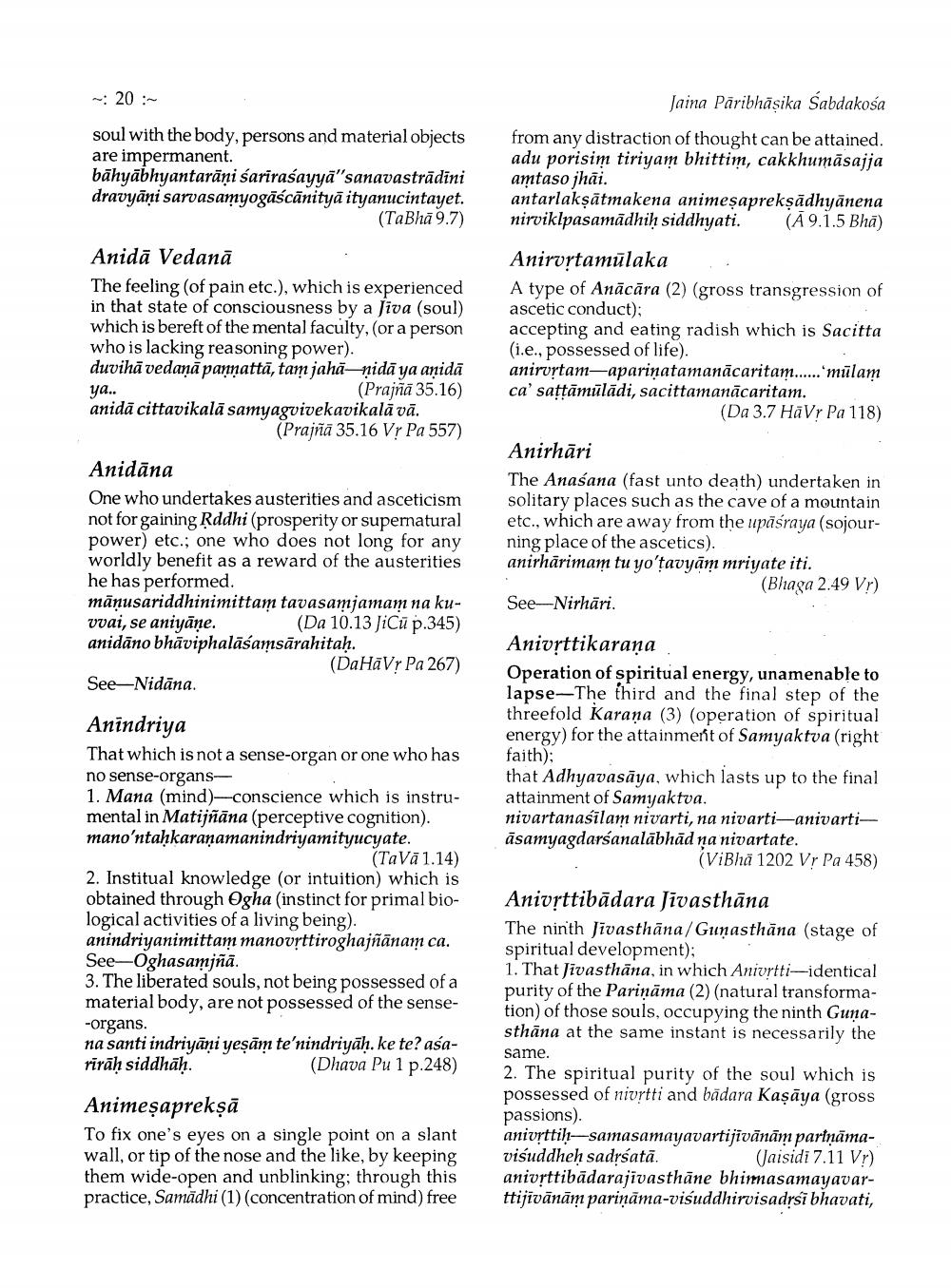________________
-: 20 :soul with the body, persons and material objects are impermanent bāhyābhyantarāņi sariraśayyā"sanavastrādini dravyāni sarvasamyogāscānityā ityanucintayet.
(TaBhā 9.7)
Anidā Vedanā The feeling (of pain etc.), which is experienced in that state of consciousness by a Jiva (soul) which is bereft of the mental faculty, (or a person who is lacking reasoning power). duvihā vedaņā pannattā, tam jahā—nidā ya anidā ya..
(Prajna 35.16) anidā cittavikalā samyagvivekavikalā vā.
(Prajña 35.16 VPa 557)
Jaina Pāribhāṣika Sabdakosa from any distraction of thought can be attained. adu porisim tiriyam bhittim, cakkhumäsajja amtaso jhāi. antarlaksātmakena animeşapreksādhyanena nirviklpasamādhih siddhyati. (Ā9.1.5 Bhā) Anirvítamülaka A type of Anācāra (2) (gross transgression of ascetic conduct); accepting and eating radish which is Sacitta (i.e., possessed of life). anirustam-aparinatamanācaritam...... mūlam ca' sattāmülādi, sacittamanācaritam.
(Da 3.7 HāVr Pa 118)
Anidāna One who undertakes austerities and asceticism not for gaining Rddhi (prosperity or supernatural power) etc.; one who does not long for any worldly benefit as a reward of the austerities he has performed. māņusariddhinimittam tavasamjamam na kuvvai, se aniyāne. (Da 10.13 JiCū p.345) anidāno bhāviphalāśamsārahitaḥ.
(DaHĪVr Pa 267) See-Nidāna.
Anirhāri The Anasana (fast unto death) undertaken in solitary places such as the cave of a mountain etc., which are away from the upăsraya (sojourning place of the ascetics). anirhārimam tu yo'țavyām mriyate iti.
(Bhaga 2.49 Vr) See-Nirhāri.
Anivșttikaraņa Operation of spiritual energy, unamenable to lapse-The third and the final step of the threefold Karana (3) (operation of spiritual energy) for the attainment of Samyaktva (right faith); that Adhyavasāya, which lasts up to the final attainment of Samyaktva. nivartanasilam nivarti, na nivarti-anivartiāsamyagdarśanalābhād na nivartate.
(ViBhã 1202 Vr Pa 458)
Anindriya That which is not a sense-organ or one who has no sense-organs1. Mana (mind)-conscience which is instrumental in Matijñāna (perceptive cognition). mano'ntahkaranamanindriyamityucyate.
(Tavā 1.14) 2. Institual knowledge (or intuition) which is obtained through Ogha (instinct for primal biological activities of a living being). anindriyanimittam manovrttiroghajñānam ca. See-Oghasamjñā. 3. The liberated souls, not being possessed of a material body, are not possessed of the sense-organs. na santi indriyāni yeşām te'nindriyāhke te? asarīrāh siddhāh.
(Dhava Pu 1 p.248)
Anivrttibādara Jivasthāna The ninth Jivasthāna/Gunasthāna (stage of spiritual development); 1. That Jivasthāna, in which Anivrtti-identical purity of the Pariņāma (2) (natural transformation) of those souls, occupying the ninth Guņasthāna at the same instant is necessarily the same. 2. The spiritual purity of the soul which is possessed of niðrtti and badara Kaşāya (gross passions). anivrttih-samasamayavartijivānām partņāmavisuddheh sadréatã.
(Jaisidi 7.11 Vr) anivrttibādarajivasthāne bhimasamayavarttijivānām pariņāma-visuddhirvisadrsi bhavati,
Animeşapreksā To fix one's eyes on a single point on a slant wall, or tip of the nose and the like, by keeping them wide-open and unblinking; through this practice, Samadhi (1) (concentration of mind) free




